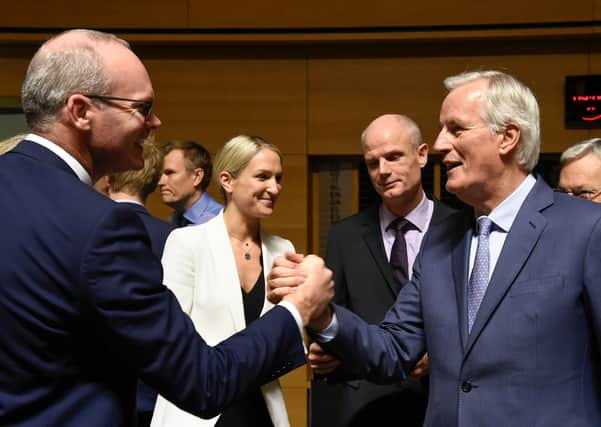Ben Lowry: Dublin could have urged EU to be flexible towards the UK, but it has not done that


The Republic’s foreign minister was speaking to Irish parliamentarians about the minor legislation that Downing Street has brought forward to enshrine one of the only sensible commitments the UK made in January’s New Decade New Approach deal.
That deal was largely a victory for Irish republicans after their long collapse of the Stormont institutions, but last week on these pages a sharp letter writer, Alan Day (see link below), pointed out a paragraph in that deal which stated explicitly that London wanted to underline that Northern Ireland “remains an integral part of the UK internal market, in line with the clear guarantee in the Protocol that Northern Ireland remains in the customs territory of the United Kingdom”.
Advertisement
Hide AdAdvertisement
Hide AdThe deal went on: “To address the issues raised by the parties, we will legislate to guarantee unfettered access for Northern Ireland’s businesses to the whole of the UK internal market, and ensure that this legislation is in force for 1 January 2021.”
When making good on this commitment, via the IMB, Northern Ireland’s secretary of state, Brandon Lewis, foolishly said that the bill would break international law “in a limited and specific way”.
In doing so he gave ammunition to Britain’s many enemies. Mr Lewis could have said that the legislation was intended to ensure that one set of legal obligations did not negate existing obligations.
Every organised nation has a vast body of laws, so it is inevitable that there will be such clashes.
Advertisement
Hide AdAdvertisement
Hide AdThe controversy over the US Supreme Court vacancy, after the death of the liberal judge Ruth Bader Ginsburg, is rooted in such clashes. That court is so powerful because it adjudicates on clashes between state laws and federal laws in America, and between both those sets of statutes and the 1788 US constitution.
Mr Lewis’s blunder caused politicians from across the political spectrum in Westminster to emerge to undermine their own national government (and delight the EU), by accusing Downing Street of “shameful” conduct (as John Major and Tony Blair put it).
Their criticisms of Boris Johnson’s administration have received widespread publicity,
Much less publicity has been given to those distinguished legal experts who have outlined why they think that the IMB is legitimate legislation, including Martin Howe QC who said there are “good arguments that the governments’s clauses will not breach international law” and Northern Ireland’s former attorney general John Larkin QC, who said that the bill violates “neither the rule of law or other constitutional principles”.
Advertisement
Hide AdAdvertisement
Hide AdMr Coveney could have been a bridging figure between the UK and EU, who urged the latter to be reasonable and not to insist on technicalities such as the so-called exit summary declaration forms for goods travelling from Northern Ireland to Great Britain. Instead he has been at the helm of building coalitions against the UK on Brexit.
On a recent trip to Washington DC Mr Coveney was holding “warm and productive meetings” with the likes of Peter King, the Republican Party congressman who is a close friend of Sinn Fein.
The Republican Party in the US is still more anglo than Irish in its world view and there would be almost zero support within the so-called Grand Old Party (GOP) for Irish terrorism, few GOP politicians give much thought to Northern Ireland. The UK and unionists need to woo such natural allies but rarely do, and so Mr King — who is entirely atypical of the Republican Party establishment — can seem to represent the party on NI.
During his US trip Mr Coveney tweeted that Dublin had support in Washington for its insistence on “full implementation of the NI/Ireland protocol” (note to Brussels: don’t give up on any aspect of your demands, such as the exit declaration forms)
Advertisement
Hide AdAdvertisement
Hide AdAgain some of us wonder if ever, just once, London will apply some pressure on Ireland and warn it that there will be some price to paid for its slavish backing for every instance of EU rigidity, when it could be urging the latter to compromise in the interests of a UK-EU deal.
The exit declaration form demand might yet be dropped by the EU, but if so no thanks will be due to the EU’s many supporters in the UK and Ireland, none of whom put any pressure on them to be flexible.
In the meantime, fingers crossed that the IMB passes in its entirety.
• Ben Lowry (@BenLowry2) is News Letter deputy editor
• Ben Lowry: International agreements should be observed but sometimes they are not kept, as Ireland has shown
Advertisement
Hide AdAdvertisement
Hide Ad• Letter: The UK and unionists are not challenging EU on its claims about the 1998 Belfast Agreement
——— ———
A message from the Editor:
Thank you for reading this story on our website. While I have your attention, I also have an important request to make of you.
With the coronavirus lockdown having a major impact on many of our advertisers — and consequently the revenue we receive — we are more reliant than ever on you taking out a digital subscription.
Subscribe to newsletter.co.uk and enjoy unlimited access to the best Northern Ireland and UK news and information online and on our app. With a digital subscription, you can read more than 5 articles, see fewer ads, enjoy faster load times, and get access to exclusive newsletters and content. Visit https://www.newsletter.co.uk/subscriptions now to sign up.
Advertisement
Hide AdAdvertisement
Hide AdOur journalism costs money and we rely on advertising, print and digital revenues to help to support them. By supporting us, we are able to support you in providing trusted, fact-checked content for this website.
Alistair Bushe
Editor